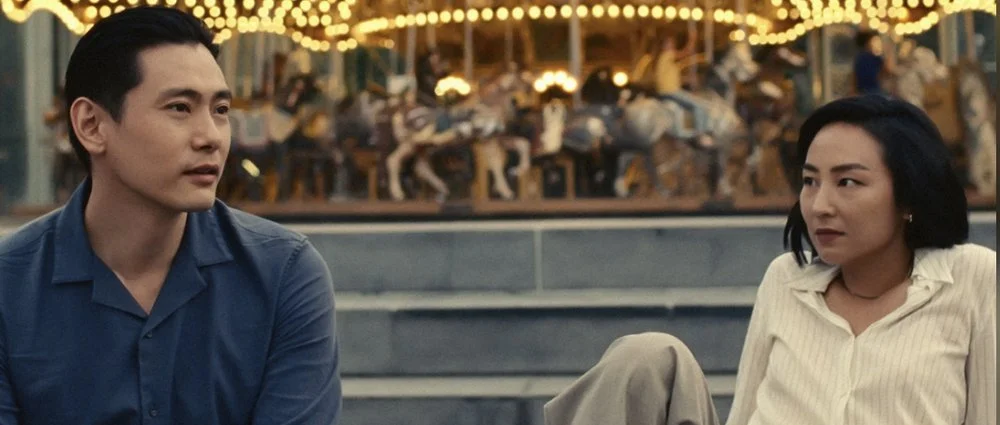Celine Song’s “Past Lives” is the small indie that wowed press this past January at Sundance and has received near-unanimous acclaim from critics since its theatrical release a couple of weeks ago.
Song’s film, shot in Korean and English, is incredibly delicate, defying commercial storytelling in favor of a more subdued, restrained and hushed-up love story.
“Past Lives” is told over three time periods as a woman finds herself drawn to a man when she's, respectively, 12, 24 and 36 years old. They never kiss. Never hold hands. This is all about repressed love.
Formerly childhood friends, Nora (Greta Lee) and Hae Sung (Teo Yoo) reconnect when they find each other on Facebook. So begins a marathon of Skyping. They catch up on everything, but Nora, now a New Yorker, starts to have renewed feelings for Hae Sung, and it turns out to be mutual, but since they know they live worlds apart from each other they decide to stop communication.
Not too long after that, Nora meets, falls in love with, and eventually marries Arthur (John Magaro), a bearded writer. That’s when the third timeline hits, set twelve years later, as Hae Sung tells Nora that he is planning to visit her in New York. She tells Arthur who, obviously, senses his wife might still have some romantic feelings for Hae Sung.
Later, Arthur tells Nora, "It's like there's this whole place inside you where I can't go." He knows about the feelings she has for Hae Sung, but never confronts her about it. It all stays pent up.
Based on her own experience as a South Korean whose parents abruptly moved the family to Canada when she was 12. Song clearly sees herself in Nora and one could easily assume that “Past Lives” is, at the very least, a semi-autobiographical account.
The strong performances here are from Lee and Yoo. I wasn’t as enticed by Magaro’s work, his acting delivered a tad too predictably. However, Lee and Yoo do give soul-deep performances. They are the reason why this movie works, not Song, whose visual style can sometimes feel flat. You can tell she hails from the stage; her cinematic frames just don’t come alive enough. “Past Lives” doesn’t feel cinematic.
Part of the problem with “Past Lives” lies in the fact that Nora and Hae Sung are clinging to a past where they were just 12 years old. Once they reconnect, they don’t necessarily bond over any particular interests that they might share, or a connecting tissue that binds them together, no, it’s always about the fact that they liked each other when they were tweens.
For a couple that's supposed to be in love they never have anything noteworthy to share. They stare at the ground, contemplate, abstractly ruminate about the past. Obviously, the film is filled with nothing but ambivalence, and it does result in a few powerful scenes, but I always knew how this film was going to end. Once a filmmaker gets hooked on ambivalence, there’s no way they can muster up the courage to get out of that mode. Ambiguity this becomes a contagion.
There is no breakthrough in the story; it’s all glances, stares and bouts of shyness that fill up Nora and Hae Sung’s minimalist conversations. For Song, it’s all about subtext, distances, no touching and facial expressions. And I get that, it works in covering mood, but it also feels incredibly calculating and puts you at a distance.
It’s a very respectable little film; a bittersweet ode to lost love that, quite predictably, refuses to inch towards catharsis. There’s no energy, no drama, just massively unrequited love.
A24 gave Song, the noted playwright of "Endings,” who's never directed a feature film in her life, an opportunity, at 34, to showcase her movie chops. It was a gamble, and the praise from critics has turned her into the next big thing in the American indie scene. I don’t buy the hype. [B]






